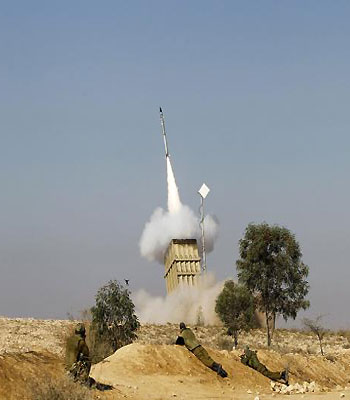
Israeli soldiers watch as an Iron Dome launcher fires an interceptor rocket near Beersheba. (R)
GAZA, (Reuters) – Israel exchanged the fiercest fire with Hamas in years after assassinating its military mastermind and threatening a wider offensive in the Gaza Strip to stem Palestinian rocket salvoes.
Launched on Wednesday during a deceptive lull in almost a week of surging cross-border violence, Israel’s air assault had an intensity recalling the outset of the 2008-09 Gaza war though this time the Palestinian death toll of 13 was far lower.
Hamas, reeling at the strategic loss of top commander Ahmed Al-Jaabari in a devastating strike on his car, resumed rocket attacks against the Jewish state’s desert south.
Israeli police said more than 80 rockets and mortars were fired in from Gaza after Jaabari’s death. Israel’s military said its Iron Dome interceptor had shot down 27 of the missiles. On either side of the frontier, people fled streets for cover.
Expecting days or more of fighting, Israel warned Hamas all its men were in its sights and weathered censure from influential Arab powers Egypt and Qatar. The United States condemned Hamas, shunned by the West as an obstacle to peace.
“Today we relayed a clear message to the Hamas organisation and other terrorist organisations,” Israeli Prime Minister Benjamin Netanyahu, a rightist whom opinion polls favour for re-election in a Jan. 22 ballot, said in televised statement.
He said the Gaza operation, dubbed “Pillar of Defence” in English and “Pillar of Cloud” in Hebrew after the Israelites’ divine sign of deliverance in Exodus, could be stepped up. The military said it had prepared options for a Gaza ground sweep.
That, Hamas said, would “open the gates of hell” for Israel, more isolated than ever by the Arab Spring’s Islamist tilt.
Israel said it had destroyed much of Gaza’s longer-range rocket stockpiles, an assertion seemingly confirmed when Hamas claims of hits on ambitious targets like Tel Aviv, Israeli naval craft and secret intelligence bases proved false.
The Palestinians sought diplomatic recourse. Hamas urged Arab powers to halt the “barbaric” Israeli assault. Hamas’ U.S.-backed rivals in the Israeli-occupied West Bank, the administration of Palestinian President Mahmoud Abbas, condemned Israel at the United Nations for “illegal criminal actions.”
Thirteen Gazans, including three children, were killed, the Hamas government said, and about 100 were wounded. More than 100 air strikes pounded Gaza throughout the night, and three members of a Hamas rocket crew were killed. Also among the dead were a baby and a woman pregnant with twins.
The rockets of Wednesday and early Thursday caused no Israeli casualties.
EGYPT RECALLS AMBASSADOR
Egypt, whose new Islamist-rooted government pledged to honour the 1979 peace treaty with Israel and had brokered a Gaza truce on Tuesday, condemned the new Israeli raids as a threat to regional security, recalled its ambassador from Israel and called for an emergency session of the U.N. Security Council.
Pro-Western Qatar demanded the Israelis be “punished” and the Arab League called a meeting to discuss Gaza on Saturday.
The United States, by contrast, placed the onus for the Gaza escalation on Hamas and said it backed Israel’s “self-defence.”
“There is no justification for the violence that Hamas and other terrorist organisations are employing against the people of Israel,” said Mark Toner, deputy State Department spokesman.
The flare-up on Israel’s southern front came in a week when, up north, it fired at Syrian artillery positions it said had fired into the Israeli-annexed Golan Heights amid a civil war in Syria that has brought renewed instability to Lebanon next door.
A second Gaza war has loomed on the horizon for months as waves of Palestinian rocket attacks and Israeli strikes grew increasingly more intense and frequent.
Israel’s Operation Cast Lead in 2008-2009 began with a week of air attacks and shelling, followed by a land invasion of the blockaded coastal strip, sealed off at sea by the Israeli navy. Some 1,400 Palestinians were killed and 13 Israelis died.
Though Netanyahu pledged in person “to do everything in order to protect our citizens,” a statement issued by his security cabinet after an evening meeting outlined a more limited goal of “improving the security situation.”
The ministers also gave their provisional authorisation for Israel to mobilise its military reserves, if required.
Hamas has been emboldened by the Islamist rise to power in Egypt, viewing President Mohamed Mursi as a “safety net” who will not permit a second Israeli thrashing of Gaza, home to 1.7 million Palestinians.
Hamas is also supported by Iran, which Israel regards as a rising threat to its own existence due to its nuclear programme.
Helped by the contraband trade through tunnels from Egypt, Gaza militias have smuggled in longer-range rockets.
But their estimated 35,000 Palestinian fighters are still no match for Israel’s F-16 fighter-bombers, Apache helicopter gunships, Merkava tanks and other modern weapons systems in the hands of a conscript force of 175,000, with 450,000 in reserve.

Palestinian man sits inside damaged house after Israeli air strikes in Gaza. (R)

Egyptians chant slogans against latest Israel airstrikes in Gaza during a protest in Cairo, Wednesday, Nov. 14, 2012. (AP)
